Udaya Tara Nayar is a film journalist in India.
Udaya Tara Nayar | |
|---|---|
| Born | Udaya Tara Nayar 15 August 1947 |
| Parent | Shri S Ayyappan Pillai (father) |
Udaya Tara Nayar is a film journalist in India.
Udaya Tara Nayar | |
|---|---|
| Born | Udaya Tara Nayar 15 August 1947 |
| Parent | Shri S Ayyappan Pillai (father) |
Udaya Tara Nayar was born in Trivandrum on 15 August 1947 as the fifth child of Shri S Ayyappan Pillai, Commissioner of Trivandrum Corporation, and Jebalabai. She had her initial schooling at Holy Angels Convent, Kunnukuzhi, Trivandrum. Her father moved to Mumbai after he retired and Udaya Tara Nayar continued her schooling in Mumbai at St Anthony’s High School, Chembur. She graduated in English Literature and French from the University of Mumbai as a student of Ramnarain Ruia College in 1966.
Udaya Tara Nayar began her journalism career in 1967 at Screen , under the mentorship of editor Shri S S Pillai, her paternal uncle. Pillai fostered an ethic of writing "from her conscience, adhering to facts and truths, treating all as equal, not hurting anyone, taking a detached, objective approach." This helped Mrs Nayar earn a reputation for being unbiased and balanced in her writing.
In 1995, Mrs Nayar launched the Screen Awards ,[ dubious – discuss ] the first awards of the Hindi cinema industry to be judged by a jury representing all sectors and crafts of the industry. Under her leadership, the Screen Awards became noted for their fairness and freedom from manipulation and bias.
In 1996, Mrs Nayar left Screen to pursue personal commitments. In her absence, the publication changed from a broadsheet format to a magazine format. Mrs Nayar returned in 1998 as editor, and restored the broadsheet format.
In 2000, Mrs Nayar once again left Screen to help raise her grandchildren. It was at this time that Dilip Kumar approached her to write his biography, The Substance and the Shadow, [1] [2] which made the Amazon bestseller list within two weeks of its publication.[ citation needed ]
Mrs Nayar has won the following honours, recognitions and awards for her contribution to cinema journalism:
Mrs Nayar is married to V V Nayar, a pharmaceutical executive. They have one daughter, Vasanthamalini, and two grandchildren. As of September 2014 [update] , Mrs Nayar is writing a book of short stories set in the southern India of her youth, dedicated to her grandchildren.

Dilip Kumar was an Indian actor who worked in Hindi cinema. Credited with pioneering method acting in cinema, he dominated the Indian cinema from the late 1940s throughout the 60s, being referred to as Abhinay Samrat. Kumar holds the record for most wins for the Filmfare Award for Best Actor and was also the inaugural recipient of the award. He holds the most dominant box-office record for a star in Hindi cinema with over 80% box-office successes and several long-standing gross records.
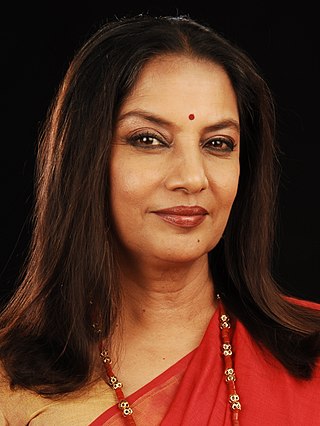
Shabana Azmi is an Indian actress of film, television and theatre. Her career in the Hindi film industry has spanned over 160 films, mostly within independent and neorealist parallel cinema, though her work extended to mainstream films as well as a number of international projects. One of India's most acclaimed actresses, Azmi is known for her portrayals of distinctive, often unconventional female characters across several genres. She has won a record of five National Film Awards for Best Actress, in addition to six Filmfare Awards and several international accolades. The Government of India honoured her with the Padma Shri in 1998 and the Padma Bhushan in 2012.
The Filmfare Awards are annual awards that honour artistic and technical excellence in the Hindi-language film industry of India. The Filmfare ceremony is one of the most famous film events in India. The awards were introduced by Filmfare magazine of The Times Group in 1954, the same year as the National Film Awards. They were initially referred to as the "Clare Awards" or "The Clares" after Clare Mendonça, the editor of The Times of India and modelled after the Academy Awards.

Baldev Raj Chopra was a prolific Indian director and producer noted for pioneering the Hindi film industry and television series. He's known for directing notable films, such as Afsana, Ek Hi Raasta, Naya Daur, Sadhna, Kanoon, Gumrah, Hamraaz, Dhund, Pati Patni Aur Woh, Insaf Ka Tarazu and Nikaah. He also produced hit films, including Dhool Ka Phool, Waqt, Ittefaq, Aadmi Aur Insaan, Chhoti Si Baat, The Burning Train, Aaj Ki Awaaz, Baghban and the TV series, Mahabharat. He was awarded Dadasaheb Phalke Award, India's highest award in cinema, for the year 1998, and Padma Bhushan, India's third highest civilian award, in 2001.
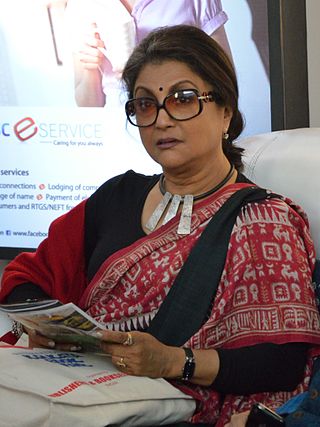
Aparna Sen is an Indian film director, screenwriter and actress who is known for her work in Bengali cinema. She has received several accolades as an actress and filmmaker, including nine National Film Awards, five Filmfare Awards East and thirteen Bengal Film Journalists' Association Awards. For her contribution in the field of arts, the Government of India honoured her with Padma Shri, the country's fourth highest civilian award.
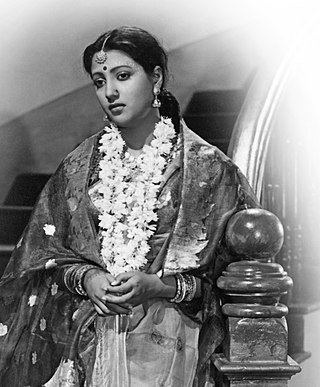
Suchitra Sen, widely known as the Mahanayika, was an Indian actress who worked in Bengali and Hindi cinema. The movies in which she was paired opposite Uttam Kumar became classics in the history of Bengali cinema.

Adoor Gopalakrishnan is an Indian film director, script writer, and producer and is regarded as one of the most notable and renowned filmmakers in India. With the release of his first feature film Swayamvaram (1972), Gopalakrishnan pioneered the new wave in Malayalam cinema during the 1970s. In a career spanning over five decades, Gopalakrishnan has made only 12 feature films to date. His films are made in the Malayalam language and often depict the society and culture of his native state Kerala. Nearly all of his films premiered at Venice, Cannes and Toronto International Film Festival. Along with Satyajit Ray and Mrinal Sen, Gopalakrishnan is one of the most recognized Indian film directors in world cinema.

Supriya Devi was an Indian actress who is known for her work in Bengali cinema for more than 50 years. She is best known for her portrayal of Neeta in Ritwik Ghatak's Bengali film Megha Dhaka Tara (1960). She was conferred the Filmfare Award and the BFJA Award twice. In 2011, she received the Banga-Vibhushan, the highest civilian honour in West Bengal. In 2014, she was awarded the Padma Shri by the Government of India, the fourth highest civilian award in India, for her contributions to the entertainment industry.
Sanjit Narwekar is an Indian documentary filmmaker scriptwriter and author. A 1967 alumni of Bombay Scottish High School, Mumbai, he completed his Bachelor's in Statistics (1974) and his Master's in Economics (1976) from the University of Mumbai.
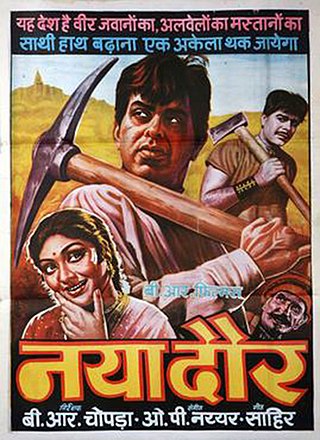
Naya Daur is a 1957 Indian Hindi-language social drama film directed and produced by B. R. Chopra. It was written by Akhtar Mirza. It stars Dilip Kumar, Vyjayanthimala in lead roles, along with Ajit, Jeevan, Johnny Walker, Chand Usmani, Nazir Hussain, Manmohan Krishna, Leela Chitnis, Pratima Devi, Daisy Irani, Radhakishan form an ensemble cast. The film narrates the story of Shankar and Krishna, two best friends who fall for the same woman, Rajni.
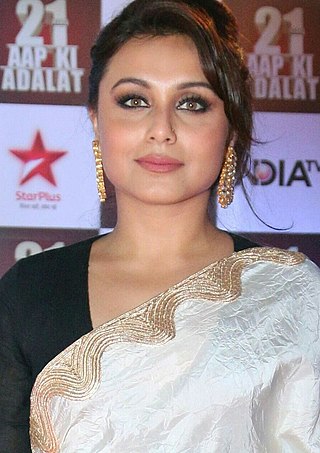
The Zee Cine Critics Award - Best Actress is chosen by a jury organized by Zee Entertainment Enterprises. It is a category of Zee Cine Award for the Hindi film industry. They were instituted in November 1997 to award "Excellence in cinema - the democratic way".
Screen was an Indian weekly film magazine published by Indian Express Limited. Established in 1951, it was owned by The Indian Express Group. The magazine was acquired by Star India in 2015 and subsequently ceased publication.
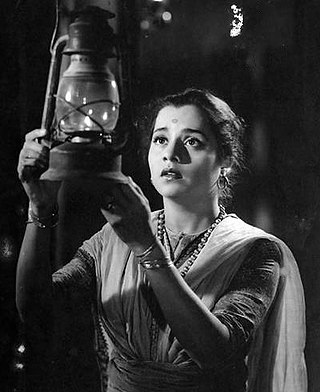
Usha Kiran was an Indian actress. In a career spanning over four decades, she acted in over 50 Hindi and Marathi films, notably Daag (1952), Patita (1953), Baadbaan (1954), Chupke Chupke (1975), Mili (1975) and Bawarchi (1972). She was also the Sheriff of Mumbai during 1996 and 1997.

Uday Prakash is a Hindi poet, scholar, journalist, translator and short story writer from India. He has worked as administrator, editor, researcher, and TV director. He writes for major dailies and periodicals as a freelancer. He has also received several awards for his collection of short stories and poems. With Mohan Das he received Sahitya Academi Awards in 2011. He is the first author to return his Sahitya Akademi award on September 3, 2015 against the killing of M. M. Kalburgi that initiated a storm of national protests by writers, artists, scholars and intellectuals.
The 54th National Film Awards, presented by Directorate of Film Festivals, the organisation set up by Ministry of Information and Broadcasting, India to felicitate the best of Indian Cinema released in the year 2006.
The 41st National Film Awards, presented by Directorate of Film Festivals, the organisation set up by Ministry of Information and Broadcasting, India to felicitate the best of Indian Cinema released in the year 1993. Ceremony took place in 1994.

The 50th National Film Awards, presented by Directorate of Film Festivals, the organisation set up by Ministry of Information and Broadcasting, India to felicitate the best of Indian Cinema released in the year 2002.

Celluloid Man is a 2012 documentary film directed by Shivendra Singh Dungarpur that explores the life and work of legendary Indian archivist P. K. Nair, founder of the National Film Archive of India and guardian of Indian cinema.

Dilip Kumar: The Substance and the Shadow is a book about the filmmaker and politician Dilip Kumar that was written by the film journalist Udaya Tara Nayar. The first part of the book chronicles Kumar's and career; using first-person narrative, the autobiography chronicles Kumar's childhood in Peshawar, British India ; his education, his 62-year-long cinematic and political career, and his two marriages. The other part contains recollections from 43 of his collaborators and acquaintances. It was published on 20 June 2014 by Hay House.